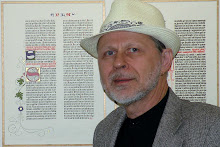Back in the late '80s, I saw a remarkable concept video that showed a young man learning to read using a portable device. After choosing a sports article he put it on the screen. The device scanned the article and displayed it, then prompted the student as he read aloud from the screen. The device was called a Knowledge Navigator from Apple Computer. It was a concept way ahead of its time, like so many others that have arisen and died, only to be produced as "new concepts" years later.
Garnering over 30,000 votes in the CES "Last Gadget Standing" competition and earning 4th place, the Intel Reader claims that prize this year. A boxy little device with a fairly small screen, the Intel Reader captures text through a 5mp camera, then converts it on the fly to the spoken word. It is listed as assistive technology for the blind, but you can readily see its potential application for many other uses as well. A rapid OCR reader could be used for converting any text page to both spoken and printed words. I have to wonder if I could even use it on my computer screen to capture content right off the screen. It is evidence that assistive technology has benefits to all the population.
A number of years ago I was privileged to meet Dr. David H. Rose, founder of the Center for Applied Special Technology (CAST). I was promoting an education prototype device and Dr. Rose gave me some advice that I've held close ever since. "When you design for the fringe, everyone benefits." Certainly, the Intel Reader is one of those devices, designed for a fringe population, that could have far-reaching benefits for all readers.
Unfortunately, as is the case with much assistive technology, the Intel Reader is priced out of the range for anyone who can't get assistance in purchasing it. At $1499, it is likely to remain locked into a small niche until more mainstream devices license and commercialize the technology.
Last Gadget Standing: Intel Reader.
Computer Technology Link: Intel Reader Order Info.
Intel Corporation: New Intel® Reader Transforms the Printed Word.
Subscribe to:
Post Comments (Atom)

No comments:
Post a Comment